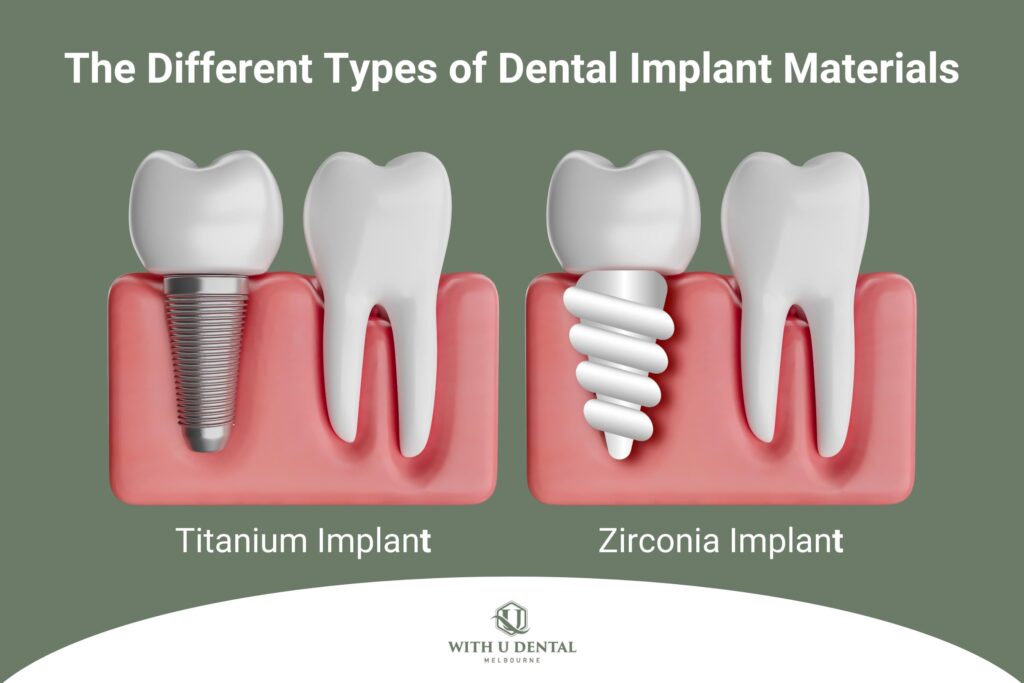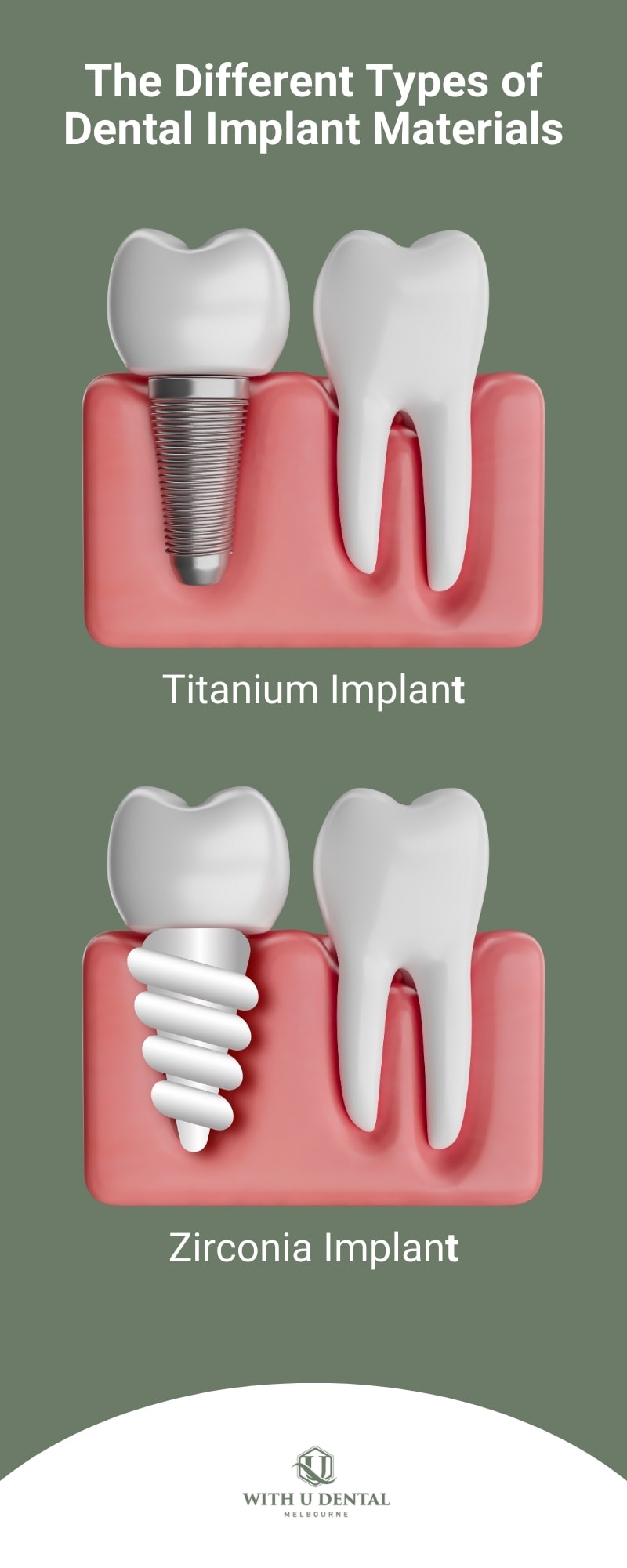The right dental implant materials are crucial for the success of your new, permanent smile. But with options like titanium and zirconia, it can all feel a bit overwhelming. Let’s break down the types of dental implant materials, as well as their benefits and drawbacks.
It’s always best to get professional advice before making a final choice. Contact With U Dental today for a complimentary appointment to discuss what kind of implant materials would work best for you.
The Different Types of Dental Implant Materials


The right implant material plays a key role in the success and longevity of your new smile. Let’s dive into the common dental implant material types and their unique advantages.
Titanium Implants
Titanium is a strong metal used for dental implants. It reigns supreme as the most widely used dental implant material. Its stellar biocompatibility and ability to fuse with bone make it a safe and reliable choice. Titanium’s strength, durability, and longevity allow it to withstand the forces of chewing.
Titanium also has a very low risk of allergy or sensitivity, which makes it suitable for most patients. While slightly more expensive up front, titanium’s long-term success makes it a cost-effective option.
However, a potential concern with titanium artificial tooth roots is a slight grey tint visible under thin gums. In very rare cases, galvanic corrosion may occur in patients with other metal restorations.
Zirconia Implants
Zirconia dental implants, made from zirconium dioxide, are a popular alternative to titanium implants. They integrate well with the jawbone and have low allergy risk. Moreover, zirconia’s naturally white colour makes it excellent for aesthetic purposes, seamlessly blending with natural teeth.
These implants are also strong and durable, making them a long-lasting solution. They are slightly more expensive than titanium; however, their combination of strength, aesthetics, and hypoallergenic nature makes them an attractive option for many patients.
Emerging Dental Implant Materials
PEEK (Polyether Ether Ketone)
Also called polyetheretherketone, PEEK is a high-performance plastic polymer gaining attention in the world of implant dentistry. As a metal-free option, it’s particularly appealing to patients with metal allergies.
It also has great shock absorption properties, replicating the flexibility of natural tooth roots. This aspect could reduce stress on the surrounding jawbone. Additionally, its natural colour offers cosmetic advantages over titanium implants.
However, it’s important to note that research on PEEK dental implants is ongoing. Some disadvantages of PEEK include that it is very expensive and can be difficult to manufacture. More long-term studies are needed to fully determine its viability as a standard implant material.
Tantalum
Tantalum is a bioinert and highly biocompatible metal sometimes used in dental implants. It has impressive corrosion resistance, and its incredible antibacterial and osseointegration properties make tantalum extremely unlikely to trigger an adverse reaction.
This makes it a potential option for patients with sensitivities to other implant materials. However, tantalum implants are much more expensive and less commonly used compared to traditional titanium or zirconia implants. This is mainly due to higher material costs and more complex manufacturing processes.
Why Material Matters in Dental Implants
The materials used in dental implants affect how well your implant bonds with your jawbone (successful osseointegration), its overall strength (biting force resistance), and even the health of your surrounding gums. Your dentist will also carefully consider aesthetics and your budget when recommending implant materials. Let’s look at why the right material choice is crucial for your long-lasting smile.
Biocompatibility and Allergies
Dental implants prioritise your safety with biocompatible materials like titanium and zirconia. These materials generally don’t cause harmful reactions within the body. This makes the risk of allergies or rejection extremely low, which ensures long-term comfort.
However, some individuals may have metal sensitivities. In these rare cases, zirconia offers a completely metal-free alternative for dental implants.
Durability and Strength
Dental implants are designed to be a long-lasting solution for missing teeth. Built to last, dental implant materials should withstand the biting and chewing forces of your natural teeth.
Titanium is renowned for its exceptional strength and has a long track record of success. Zirconia, another popular implant material, is also incredibly durable. Weaker materials may be prone to fracture, chips, or excessive wear over time, potentially leading to implant failure.
Osseointegration
Osseointegration is the biological process in which your jawbone naturally fuses with the dental implant anchor. This creates a rock-solid foundation that mimics a tooth root. Osseointegration is vital for implant success.
Highly biocompatible materials like titanium and zirconia encourage healthy osseointegration because your body readily accepts them. However, certain less biocompatible materials may cause inflammation around the implant site. This may lead to a weaker bond, infection, and an increased risk of implant failure.
Cost
Dental implants are a significant investment. While prices vary, you can expect to pay more for zirconia implants than titanium. This difference is usually due to the higher material and fabrication costs associated with zirconia.
However, it’s important to remember that implant cost is just one factor. Your dentist will help you balance your budget with your individual needs, aesthetic preferences, and the overall potential for long-term success.
Aesthetics
Beyond functionality, dental implants play a major role in restoring your smile’s natural beauty. Zirconia implants have a tooth-coloured appearance, seamlessly blending with your existing teeth. This makes them especially great for replacing front teeth. Traditional titanium implants may have a slight greyish tint. So, in patients with thin gum tissue, titanium implants could become slightly visible.
Types of Dental Implants to Choose From
Finding the best tooth implant material means finding the one that best matches your needs and jawbone health. Let’s explore the different types of implants and what they can offer for your smile restoration.
Endosteal Implants
Endosteal implants are the most popular type of dental implant. They are surgically placed directly into your jawbone and come in various shapes. Your dentist can choose from screws, cylinders, or blades, depending on your needs.
Subperiosteal Implants
Subperiosteal implants offer an alternative for patients who lack the jawbone density necessary for traditional endosteal implants. Instead of being placed directly into the jawbone, a custom-made metal framework rests on top of the bone, just beneath the gum tissue. This framework has posts that protrude through the gums, providing stable anchors for your replacement teeth.
Zygomatic Implants
Zygomatic implants provide a lifeline for patients with extreme bone loss in the upper jaw, where traditional implants aren’t possible. These longer implants anchor securely into the cheekbone, offering a stable foundation for a new smile.
Making Your Decision: Factors to Discuss with Your Dentist
Choosing the right dental implant is a collaborative decision between you and your dentist. Here are some key factors you’ll want to discuss with your dental professional.
Your Jawbone Health and Density
Your jawbone health directly impacts your implant options. Strong jawbones are ideal for most implant types. If you have bone loss, bone grafting might be necessary. For severe bone loss, specialised implants (like subperiosteal or zygomatic) may offer a solution.
Number of Teeth Being Replaced
The number of teeth you need replaced will have an impact on what kind of dental implant you get.
- Replacing a Single Tooth: Endosteal implants are the go-to solution for a natural-looking single tooth replacement.
- Replacing Multiple Teeth: Your dentist might recommend a combination of individual implants, an implant-supported bridge, or an All-on-4 approach depending on your specific needs.
- Replacing a Complete Arch: For full arch replacement, All-on-4 dental implant systems or implant-supported dentures offer excellent stability and function.
Location of the Missing Teeth
If you’ve lost your front teeth, aesthetics are important. Zirconia or ceramic-coated titanium often provides the most natural look. For back teeth, you want strength for chewing – both titanium and zirconia would be good choices.
Your Dentist’s Recommendations Based on Their Expertise
Dentists with a focus on implant placement have in-depth knowledge of different implant systems, materials, and surgical techniques. They can assess your specific situation and recommend the best path. Your dentist will guide you in understanding the pros and cons of different implant types.
Conclusion
The best material for dental implants depends on your unique situation. Titanium remains the best teeth implant material because it offers strength, high success rates, and biocompatibility. Zirconia looks great and may be ideal for those with metal sensitivities. Talk to your dentist about your options to find the perfect fit for your smile restoration journey. Book a complimentary appointment with one of our dentists in Melbourne today!
Dental Implant Materials FAQs
How Long Do Titanium Implants Last?
Titanium dental implants can last for up to 20 years with proper care, maintenance, and oral hygiene. The implant post or anchor is designed to be a permanent solution. However, with normal wear and tear, the dental crown may need to be replaced every 10 to 15 years.
How Does the Implant Material Affect the Healing Process?
The biocompatibility, surface texture, and corrosion resistance of each implant material will affect the healing process. Highly biocompatible materials, such as titanium and zirconia, minimise immune reactions, resulting in faster healing and better integration into the jawbone. Additionally, rough implant surfaces promote bone cell adhesion and development, accelerating osseointegration. Finally, corrosion-resistant materials reduce inflammation and tissue irritation, helping with a smoother recovery.
Is Titanium Safe for Your Body?
Yes, titanium is considered safe for use in the human body. It is known for its biocompatibility, meaning your body is unlikely to reject it. Titanium is widely used in dental implants, joint replacements, and other medical devices. Its strength, corrosion resistance, and ability to integrate with bone tissue make it a popular choice for implants. However, it’s always best to discuss any concerns with your dentist or healthcare provider.
Note: Any surgical or invasive procedure carries risks. Before proceeding, you should get a second opinion from an appropriately qualified health practitioner.
Back to top: Dental Implant Materials


